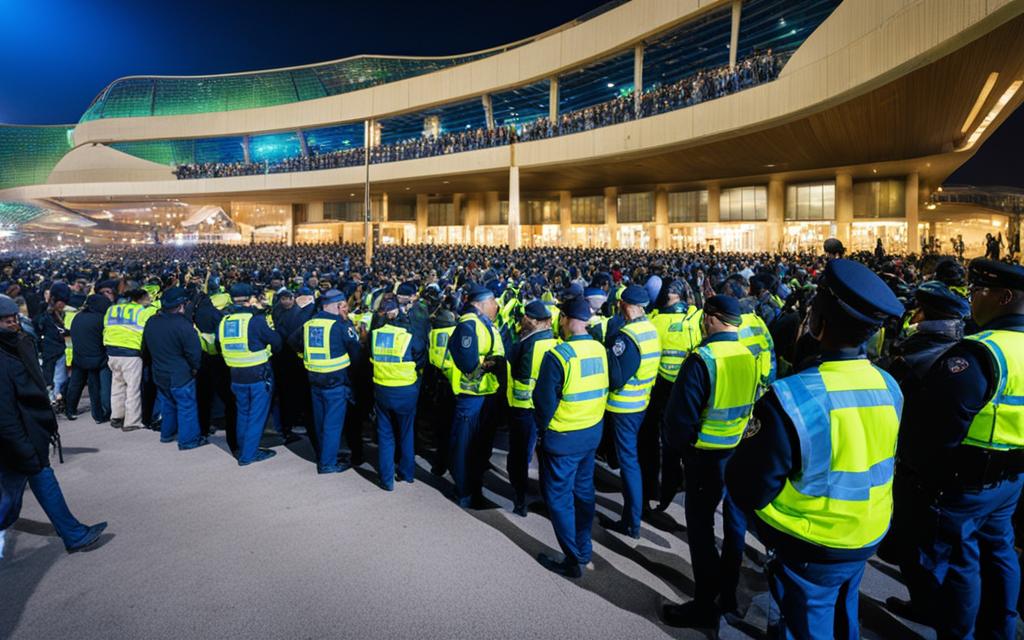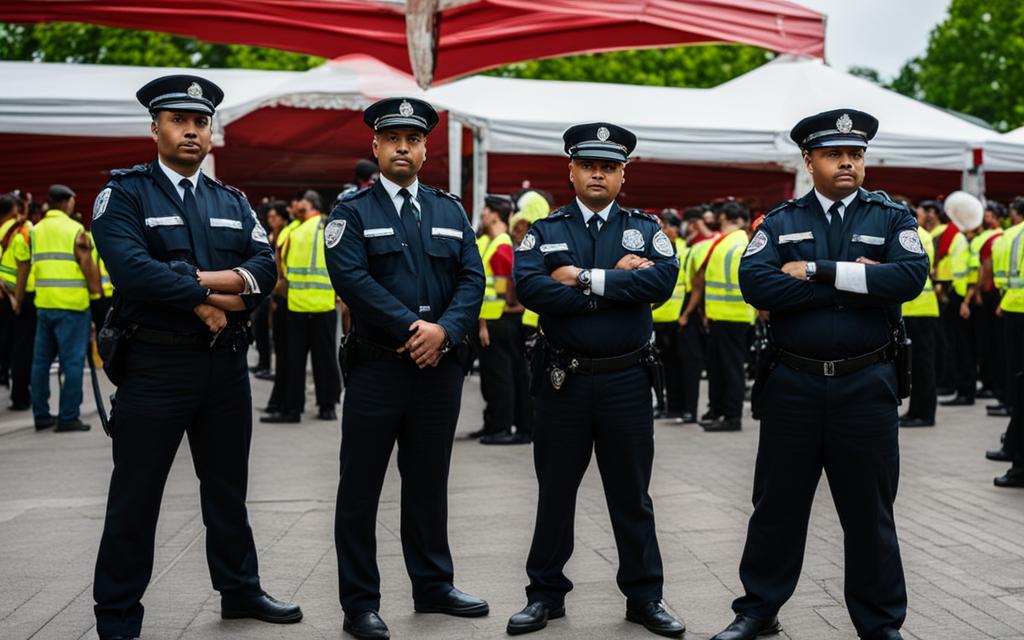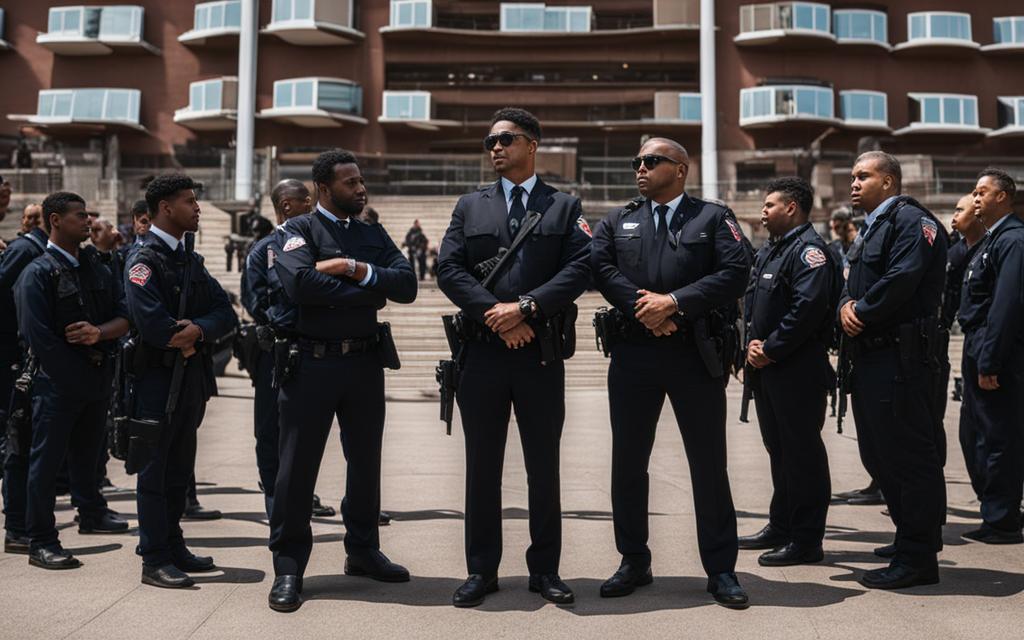Organizing a successful event requires careful planning and preparation. One crucial aspect that must be taken seriously is event security. The safety and security of your attendees should be your top priority, and implementing reliable event security measures can help achieve this goal. In this section, we will provide you with valuable tips to ensure reliable event security. By implementing these strategies, you can create a safe and secure environment for your gathering.
Key Takeaways:
- Ensure event security is a top priority for your event planning.
- Implement reliable event security measures to create a safe and secure environment for all attendees.
- Proper event security planning and management can help minimize risks and potential incidents.
- Consider hiring professional event security services to ensure well-trained and experienced personnel are in charge of event security.
- Conduct thorough event risk assessments and implement effective crowd control and emergency planning strategies.
Importance of Event Security
When planning an event, one of the most critical considerations is ensuring the safety and security of all attendees. Whether it is a small gathering or a large-scale event, event security is essential to prevent any potential risks and maintain event safety. Event security involves the implementation of various measures and protocols to minimize potential risks and ensure the safety of all attendees.
Event safety is vital as it not only protects attendees but also safeguards the reputation of the event and its organizers. A security breach can have severe consequences, including legal liabilities, financial losses, and damage to the event’s image. Therefore, event risk management should be a top priority for all event organizers.
Effective event security measures can help minimize risks and potential threats. They include crowd control, access control, emergency planning, and hiring professional event security services. By implementing these strategies, event organizers can ensure the safety and security of all attendees, staff, and stakeholders.
Importance of Event Security:
“Event safety is a top priority for all event organizers, and effective event security measures can help minimize potential risks and ensure the safety and security of all attendees.”
Moreover, event security measures can also boost attendees’ confidence and enhance their overall experience. When attendees feel safe and secure, they are more likely to enjoy the event and participate in future events. On the other hand, if attendees feel unsafe or uncomfortable, they may leave early and discourage others from attending future events.
In conclusion, event security and risk management are essential considerations for all event organizers. By implementing effective event security measures, such as crowd control, access control, emergency planning, and hiring professional event security services, organizers can ensure the safety and security of all attendees while protecting the event’s reputation. Remember, a safe and secure event is a successful event.
Event Security Planning and Management
Effective event security planning and management is crucial for ensuring a safe and secure environment for all attendees. Below are some essential steps to develop and implement effective event security protocols and procedures:
- Conduct a thorough event security risk assessment: Before planning any event, conduct a thorough risk assessment to identify potential security risks and vulnerabilities. The assessment should cover all aspects of the event, including venue, attendees, vendors, and equipment. This will help you to develop an effective security plan that addresses all potential threats.
- Develop a comprehensive event security plan: Based on the risk assessment, develop a comprehensive event security plan that outlines all security protocols and procedures. The plan should include access control measures, crowd control strategies, emergency response procedures, and communication protocols. Have a clearly defined chain of command and assign specific roles and responsibilities to event staff and security personnel.
- Train event staff and security personnel: Event staff and security personnel should be properly trained in all aspects of event security planning and management. This includes training in emergency response procedures, conflict resolution, and communication protocols. Make sure that everyone involved in the event is aware of the security plan and their role in implementing it.
- Implement effective access control measures: Access control is a critical aspect of event security. Implement effective access control measures, such as bag checks, metal detectors, and ID verification, to ensure that only authorized individuals are allowed into the event. Utilize trained security personnel to manage access points and enforce access control measures.
- Utilize effective crowd control strategies: Effective crowd control strategies, such as designated seating areas, barriers, and security personnel presence, can help prevent overcrowding and minimize the risk of incidents. Develop a plan for managing crowds, including emergency procedures for evacuating the venue if necessary.
- Establish clear communication protocols: Clear communication is essential for effective event security management. Establish clear communication protocols and ensure that everyone involved in the event is aware of them. This includes emergency communication procedures and protocols for communicating with event staff, security personnel, and first responders.
- Continuously evaluate and improve security protocols: After the event, evaluate your security protocols and procedures to identify any areas for improvement. Use this information to update your security plan and make any necessary changes for future events.
By following these tips, you can develop and implement effective event security protocols and procedures to ensure a safe and secure environment for your attendees.
Hiring Professional Event Security Services
Hiring professional event security services is crucial to the success of any gathering. Event security services are responsible for ensuring the safety of all attendees and preserving the reputation of the event. When looking to hire event security, it is essential to choose a reputable event security company with extensive experience in event security management.
Professional event security personnel are trained to handle various security issues that may arise during an event. They are equipped with the necessary skills and knowledge to tackle security challenges effectively. Event security services also offer customized security solutions tailored to the specific needs of the event.
When hiring event security services, it is essential to conduct thorough research and due diligence to ensure that you are working with a reputable and reliable event security company. Look for companies with an excellent track record in event security management and check out their client reviews and testimonials.
Another crucial factor to consider when hiring event security is the level of professionalism and training of the event security personnel. Ensure that the company you choose employs highly trained and experienced security personnel with a proven track record in event security management.
Some of the benefits of hiring professional event security services include:
- Enhanced event safety and security
- Effective crowd control
- Prevention of potential security threats
- Quick response to security incidents
- Customized security solutions tailored to the event’s specific needs
“Hiring professional event security services is crucial to the success of any gathering.”
In conclusion, it is essential to hire professional event security services when hosting an event. Choose a reputable event security company with extensive experience in event security management, employ highly trained and experienced personnel, and ensure that the security solutions provided are tailored to the specific needs of the event. By prioritizing event security, you can ensure enhanced event safety and security and create a memorable and safe experience for all attendees.
Event Risk Assessment and Crowd Control
Event security risk assessment is a critical process that ensures the safety of individuals attending an event. Conducting a thorough risk assessment before the event is key to identifying potential security threats and developing appropriate measures to control them. Factors such as the location, type of event, and number of attendees can affect the level of risk and inform the overall security plan.
Crowd control is another vital aspect of event security. With large crowds, controlling the flow of people, monitoring behavior, and responding to any issues that arise can be challenging. Effective crowd control strategies aim to minimize safety risks and maintain order while ensuring attendees’ safety and comfort.

Crowd Control Techniques
Several crowd control techniques are available to ensure a safe and secure environment for event attendees. Here are some effective strategies:
- Establishing clear boundaries and perimeter security to control access to the event
- Deploying trained security personnel to monitor and manage the crowd
- Using barriers, signage, and lighting to direct the flow of people and prevent congestion
- Providing ample rest and hydration areas for attendees to avoid overcrowding
- Creating designated areas for emergency medical services and quick evacuation if necessary
Conclusion
Event security risk assessment and crowd control are crucial elements of any successful event security plan. By identifying potential risks, developing appropriate safety protocols, and implementing effective crowd control strategies, you can ensure the safety and well-being of everyone involved. Remember to prioritize event security planning and work with trained professionals to create a secure environment that allows attendees to enjoy the event with peace of mind.
Event Access Control and Emergency Planning
Implementing effective access control measures can help ensure reliable event security. Access control involves managing who can enter and exit the event space, as well as restricting access to authorized areas. Here are some essential event access control measures:
- Have a designated entrance and exit point for attendees.
- Check attendees’ IDs and tickets to ensure they have access to the event.
- Use metal detectors to scan attendees for prohibited items.
- Assign security personnel to manage access control points and prevent unauthorized entry.
In addition to access control, having a comprehensive emergency plan is crucial for maintaining event security. Emergency planning involves identifying potential risks and developing protocols for managing emergencies. Here are some key components of an effective event emergency plan:
- Identify potential emergency scenarios, such as severe weather, medical emergencies, or security threats.
- Develop an evacuation plan and designate evacuation routes.
- Train event staff on emergency procedures and designate specific roles and responsibilities.
- Proactively communicate emergency information to attendees.
By prioritizing access control and emergency planning, you can effectively manage potential security risks at your event.
Event Security Guards and Team Management
Event security guards and personnel play a critical role in ensuring the safety of your event attendees. Hiring a team of trained professionals can provide peace of mind and help mitigate potential risks. However, effective event security management goes beyond just hiring guards. It involves developing a cohesive team, implementing clear protocols and procedures, and establishing effective communication channels.
The success of your event security team will depend on a few key factors:
- Training: Ensure that your event security guards are adequately trained to handle a variety of situations. This should include training in conflict resolution, emergency response, and communication.
- Communication: Establish clear communication channels between your event security team and other event staff. This includes providing radios or other communication devices and ensuring that everyone knows who to contact in case of an emergency.
- Procedures: Develop clear procedures for handling a variety of situations, such as medical emergencies, disruptive attendees, or security breaches. Make sure that your event security team is familiar with these procedures and has rehearsed them ahead of time.
- Leadership: Appoint an experienced security manager or team leader to oversee your event security team. This person should be responsible for managing the team, implementing procedures, and liaising with event organizers.
To further enhance your event security team’s effectiveness, you may consider using technological solutions such as CCTV cameras, metal detectors, or ID scanners. These tools can help provide an extra layer of security and deter potential threats.

Remember that event security is not a one-time consideration. It requires ongoing assessment and monitoring to ensure ongoing effectiveness. Regularly review your event security procedures and protocols to identify areas for improvement and implement necessary changes.
Conclusion
Effective event security guards and team management are critical components of reliable event security. By hiring trained professionals, implementing clear procedures and communication channels, and using technological solutions, you can help ensure a safe and secure environment for your event attendees.
Event Security Best Practices and Solutions
Providing reliable event security requires careful planning and the implementation of effective security strategies. In this section, we will explore event security solutions and industry best practices to help you ensure your event runs smoothly and safely.
Event Security Checklist
Creating a comprehensive event security checklist is essential to ensure all aspects of security are covered. Your checklist should include:
- Identification and vetting of all event staff
- Establishment of event security protocols and procedures
- Conducting thorough event risk assessments
- Implementation of effective crowd management and control strategies
- Establishment of access control measures
- Implementation of emergency planning strategies and protocols
By creating a detailed checklist, you can ensure no aspect of event security is overlooked.
Event Security Providers
Working with a reputable event security provider can provide peace of mind, knowing that your event security is in capable hands. When selecting an event security provider, consider the following:
- Experience and track record in the industry
- Training and certifications of security personnel
- Range of security services offered
- Availability of on-site security management
It’s also important to establish clear communication with your event security provider to ensure all expectations are met.
Event Security Best Practices
Implementing the following event security best practices can help ensure a safe and secure event:
- Implementing a security perimeter to control event access
- Providing clear communication and instructions to attendees
- Implementing bag checks and metal detectors at entry points
- Establishing a clear emergency protocol and communication plan
- Providing training and ongoing education to event staff and security personnel
- Conducting post-event evaluations to identify areas for improvement
By following these best practices, you can help ensure a successful and secure event.
“Effective event security planning and management is crucial for the success of any gathering. Implementing comprehensive security protocols and working with reputable security providers can ensure a seamless and secure event experience for all attendees.”
Conclusion
Ensuring reliable event security is crucial for any gathering. By following the top tips discussed in this article, you can create a safe and secure environment for all attendees. Remember to prioritize event security planning, hire professional event security services, conduct thorough risk assessments, and implement effective crowd control and emergency planning strategies.
Stay Vigilant
It’s important to stay vigilant before, during, and after the event to ensure that all measures are working as intended. Keeping a watchful eye on the event location and monitoring potential threats throughout the gathering can help mitigate risks before they become a problem.
Regular Training Sessions
To ensure the highest level of event security, it’s recommended that security personnel undergo regular training sessions. This can include refresher courses on emergency procedures, communication strategies, and defensive measures that can be used in the event of an attack or other security threats.
Continual Improvement
Finally, it’s important to continually assess and improve event security measures to stay ahead of potential threats. This can include updating risk assessments, upgrading equipment, and adjusting crowd control strategies to respond to changing conditions.
By prioritizing reliable event security, you can create a memorable and safe experience for everyone involved. Don’t let security become an afterthought – start planning now to ensure a successful and secure event.
FAQ
What is event security?
Event security refers to the measures and protocols implemented to ensure the safety and security of an event. It involves strategies such as crowd control, access control, risk assessment, and emergency planning.
Why is event security important?
Event security is important to maintain the safety of attendees, protect assets and property, and minimize potential risks and liabilities. It helps create a secure environment and ensures the smooth execution of the event.
How do I plan and manage event security?
Event security planning and management involve steps such as conducting risk assessments, developing security protocols and procedures, coordinating with local authorities, and hiring trained security personnel.
Should I hire professional event security services?
Hiring professional event security services is highly recommended. They have the expertise, experience, and resources to handle various security situations effectively. They can provide trained security personnel and implement comprehensive security measures.
What is event risk assessment?
Event risk assessment is the process of identifying potential risks and hazards associated with an event. It involves analyzing the event venue, crowd dynamics, and other factors to develop strategies that minimize or mitigate risks.
How can I implement effective crowd control?
Effective crowd control involves strategies such as defining crowd flow patterns, establishing clear pathways, setting up physical barriers, and having trained security personnel to maintain order and ensure the safety of attendees.
What is event access control?
Event access control refers to the measures implemented to control and manage entry and exit points at an event. It includes procedures such as ticket validation, ID checks, bag checks, and the use of access control technology.
Why is emergency planning important for events?
Emergency planning is crucial for events to ensure preparedness in case of any unforeseen incidents or emergencies. It involves developing evacuation plans, communication protocols, and coordination with emergency services to handle emergency situations effectively.
What is the role of event security guards?
Event security guards play a vital role in maintaining event security. They are responsible for monitoring the venue, detecting potential security threats, handling crowd management, and responding to security incidents effectively.
What are some event security best practices?
Event security best practices include conducting thorough risk assessments, implementing access control measures, training security personnel, having clear emergency response plans, and regularly evaluating and updating security protocols.


